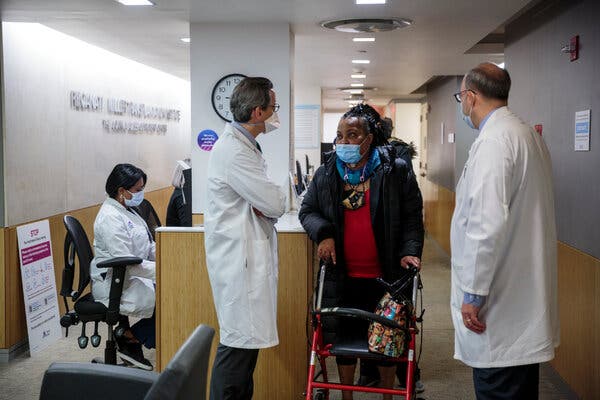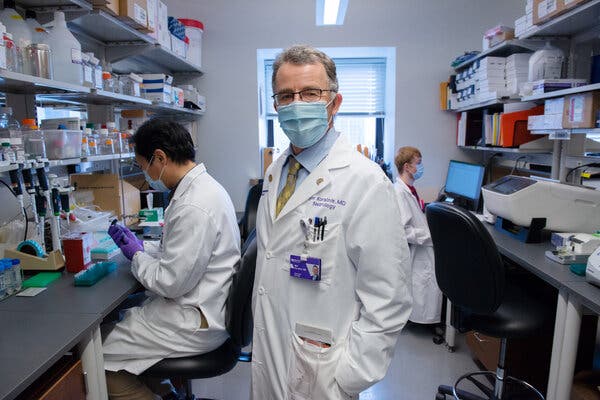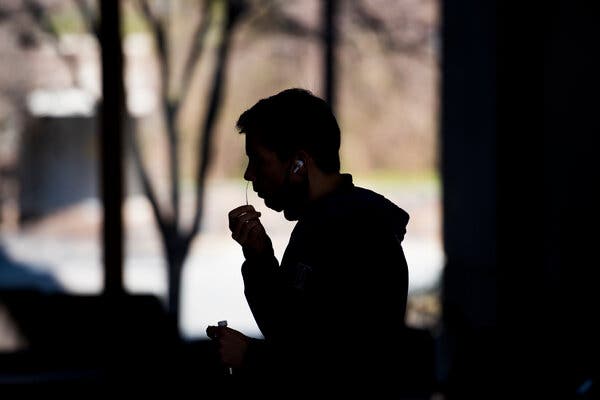Muchos niños con síndrome inflamatorio grave tuvieron covid, pero no lo sabían
El síndrome MIS-C puede afectar a los menores semanas después de infectarse con el coronavirus. Los expertos, tras publicarse el mayor estudio realizado en Estados Unidos sobre la afección, recomiendan a los pediatras estar atentos.Muchos niños y adolescentes que desarrollaron el misterioso síndrome inflamatorio que puede manifestarse varias semanas después de contraer el coronavirus nunca tuvieron los síntomas clásicos de COVID-19 al momento de su infección, según el estudio de casos más grande hasta ahora en Estados Unidos.El estudio, dirigido por investigadores de los Centros para el Control y la Prevención de Enfermedades (CDC, por su sigla en inglés), encontró que en más de 1000 casos en los que se disponía de información sobre si se habían enfermado por su COVID-19 inicial, el 75 por ciento de los pacientes no experimentaron tales síntomas. Sin embargo, de dos a cinco semanas después, se enfermaron lo suficiente como para ser hospitalizados por la afección, llamada síndrome inflamatorio multisistémico pediátrico (MIS-C, por su sigla en inglés), que puede afectar diversos órganos, especialmente el corazón.El estudio, publicado el 6 de abril en JAMA Pediatrics, afirmó que “se cree que la mayoría de las enfermedades MIS-C son el resultado de casos leves o asintomáticos de COVID-19” seguidos de una respuesta hiperinflamatoria que parece ocurrir cuando los cuerpos de los pacientes han producido su nivel máximo de anticuerpos contra el virus. Los expertos aún no saben por qué algunos jóvenes, y una cantidad menor de adultos, responden de esta manera.“Eso significa que los pediatras de atención primaria deben tener un alto índice de sospecha de esto porque la covid es muy frecuente en la sociedad y los niños a menudo tienen una enfermedad asintomática en su infección inicial de covid”, afirmó Jennifer Blumenthal, intensivista pediátrica y especialista en enfermedades infecciosas pediátricas del Hospital para Niños de Boston, quien no estuvo involucrada en el estudio.Los investigadores evaluaron 1733 de los 2090 casos del síndrome en personas de 20 años o menos que habían sido reportados a los CDC hasta enero.Los resultados muestran que, aunque el síndrome es poco común, puede ser grave. Los datos de los CDC solo incluyeron pacientes que fueron hospitalizados. Más del 90 por ciento de estas personas jóvenes experimentaron síntomas que involucraron al menos cuatro sistemas de órganos y el 58 por ciento necesitó tratamiento en unidades de cuidados intensivos.Muchos experimentaron problemas cardiacos importantes: más de la mitad desarrolló baja presión arterial, el 37 por ciento desarrolló choque cardiogénico y el 31 por ciento experimentó una disfunción cardiaca relacionada con la incapacidad del corazón para bombear de forma adecuada. El estudio afirmó que un porcentaje significativamente mayor de pacientes que no habían tenido síntomas de COVID-19 experimentaron estos problemas cardiacos, en comparación con aquellos que sí tuvieron síntomas iniciales de coronavirus. Un porcentaje mayor de pacientes que al principio fueron asintomáticos también terminaron en unidades de cuidados intensivos (UCI).“Incluso la gran mayoría de los niños con casos graves de MIS-C que estuvieron en la UCI, no tuvieron una enfermedad previa que pudieran reconocer”, afirmó Roberta DeBiasi, jefa del departamento de enfermedades infecciosas del Children’s National Hospital en Washington D. C., quien no participó en la investigación.El estudio proporcionó la imagen demográfica y geográfica más detallada del síndrome hasta la fecha. Alrededor del 34 por ciento de los pacientes eran negros y el 37 por ciento eran hispanos, lo que refleja la forma en que el coronavirus ha afectado desproporcionadamente a los miembros de esas comunidades. A medida que avanzaba la pandemia, escribieron los autores, aumentó la proporción de pacientes de raza blanca, que representaban el 20 por ciento de todos los casos. Las personas de origen asiático representaban poco más del uno por ciento de los pacientes.En general, casi el 58 por ciento de los pacientes eran hombres, pero la proporción no era la misma en todas las edades. En el grupo más joven —recién nacidos hasta los 4 años— el número de niños y niñas era prácticamente igual, y la proporción entre hombres y mujeres aumentaba en los grupos de mayor edad hasta que la proporción llegaba a más de dos en el grupo de 18 a 20 años.La gran mayoría de los pacientes (casi el 86 por ciento) eran menores de 15 años. El estudio reveló que los menores de 5 años tuvieron el menor riesgo de desarrollar complicaciones cardiacas graves y fueron menos propensos a necesitar cuidados intensivos. Los pacientes de 10 años o más tuvieron una probabilidad mucho mayor de desarrollar problemas como choque cardiogénico, presión arterial baja y miocarditis (inflamación del músculo cardiaco).“Creo que es parecido a lo que vimos con la covid, donde los niños mayores parecían tener enfermedades más graves”, dijo DeBiasi. “Y eso se debe a que lo que en realidad enferma a las personas de la covid es su aspecto inflamatorio, así que quizás estos niños mayores, por diversas razones, produjeron más inflamación en la covid inicial o en el MIS-C”.Aun así, un número significativo de los pacientes más jóvenes desarrollaron problemas cardiacos. En el grupo entre recién nacidos hasta niños de 4 años, el 36 por ciento tuvo baja presión arterial, 25 por ciento tuvo choque cardiogénico y el 44 por ciento recibió tratamiento en la UCI.Pacientes de todas las edades en el estudio experimentaron casi la misma incidencia de algunos de los problemas cardiacos menos comunes relacionados con el síndrome, como aneurismas coronarios y acumulación de líquido. Los niños de 14 años o menos fueron más propensos a tener sarpullido y enrojecimiento de los ojos, mientras que los mayores de 14 tuvieron mayores probabilidades de desarrollar dolor en el pecho, dificultad para respirar y tos. Cerca de dos tercios de todos los pacientes se vieron afectados por dolores abdominales y vómito.Se registraron 24 muertes, repartidas en todos los grupos de edad. No hubo información en el estudio sobre si los pacientes tenían afecciones médicas subyacentes, pero los médicos e investigadores informaron que las personas jóvenes con MIS-C por lo general estuvieron previamente sanas y tenían muchas más probabilidades de estar sanas que el número relativamente pequeño de jóvenes que padecieron enfermedades graves de las infecciones iniciales de covid.De los 1075 pacientes de los que se tenía información sobre la enfermedad de covid inicial, solo 265 mostraron síntomas en ese momento. Eran más propensos a ser mayores: su edad promedio fue de 11 años, mientras que la edad promedio de aquellos con infecciones de covid asintomáticas fue de 8. Sin embargo, eso podría deberse a que “los niños más pequeños no pueden expresar sus preocupaciones con la misma eficiencia”, aseguró Blumenthal, quien coescribió una editorial sobre el estudio.“En realidad no sabemos si en efecto hay menos sintomatología en la población muy joven”, concluyó.Tampoco están claras las razones que subyacen al hallazgo del estudio de que en la primera oleada de MIS-C, del 1 de marzo al 1 de julio de 2020, los jóvenes eran más propensos a algunas de las complicaciones cardíacas más graves. DeBiasi dijo que eso no coincidía con la experiencia de su hospital, donde “los niños estaban más enfermos en la segunda ola”.El estudio documentó dos oleadas de casos de MIS-C que siguieron a los aumentos de los casos generales de coronavirus durante un mes o más. “El tercer pico más reciente de la pandemia de COVID-19 parece estar conduciendo a otro pico de MIS-C que quizá implique a comunidades urbanas y rurales”, escribieron los autores.El estudio descubrió que la mayoría de los estados en los que la tasa de casos de MIS-C por población era más alta se encontraban en el noreste, donde se produjo el primer aumento de casos, y en el sur. Por el contrario, la mayoría de los estados con altas tasas de niños con COVID-19 por población, pero con bajas tasas de MIS-C, se encontraban en el Medio Oeste y el Oeste. Aunque la concentración de casos se extendió de las grandes ciudades a los pueblos más pequeños con el tiempo, no fue tan pronunciada como las tendencias generales de la pandemia, dijeron los autores.Blumenthal dijo que ese patrón geográfico podría reflejar que la “comprensión de las complicaciones de la enfermedad” no había alcanzado su prevalencia en las distintas regiones o que muchos estados con tasas más bajas de MIS-C tienen poblaciones menos diversas étnicamente. “También podría tratarse de algo relacionado con la propia covid, aunque no lo sabemos”, dijo. “En este momento, no sabemos nada sobre cómo las variantes afectan necesariamente a los niños”.El estudio representó solo los criterios más estrictos sobre MIS-C, al excluir unos 350 casos notificados que cumplían la definición del síndrome de los CDC pero tenían una prueba de anticuerpos negativa o presentaban principalmente síntomas respiratorios. DeBiasi dijo que también hay muchos casos probables de MIS-C que no se comunican a los CDC porque no cumplen todos los criterios oficiales.“Estos probables niños con MIS-C, en la vida real, son un montón de niños”, dijo. Además, aunque hasta ahora se ha centrado en los casos graves, “hay todo un grupo de niños que en realidad pueden tener MIS-C leve”.Si una comunidad ha experimentado un aumento reciente de coronavirus, entonces “solo porque el niño diga: ‘Nunca he tenido covid o mis padres nunca lo han tenido’, eso no significa que el niño que tienes delante no tenga MIS-C”, dijo DeBiasi. “Si tu ciudad tiene covid, prepárate”.Pam Belluck es una reportera de ciencia y salud cuyos galardones incluyen un Premio Pulitzer compartido en 2015 y el premio Nellie Bly a la mejor historia de primera plana. Es autora de Island Practice, un libro sobre un doctor peculiar. @PamBelluck
Read more →




